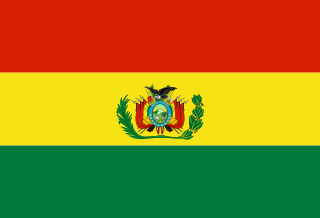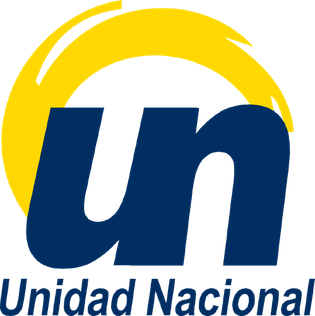
The Bolivian Armed Forces are the military of Bolivia. The Armed Forces of Bolivia are responsible for the defence, both of external and internal, of Bolivia and they are constituted by Bolivian Army, the Bolivian Air Force and the Bolivian Navy. All these institutions depend on the Ministry of Defence of this country.
Empresa Eléctrica del Ecuador or Emelec was the name of an Ecuadorian electric company based in the city of Guayaquil.

Endesa, S.A. is a Spanish multinational electric utility company, the largest in the country. The firm, a majority-owned subsidiary of the Italian utility company Enel, has 10 million customers in Spain, with domestic annual generation of over 97,600 GWh from nuclear, fossil-fueled, hydroelectric, and renewable resource power plants. Internationally, it serves another 10 million customers and provides over 80,100 GWh annually. Total customers numbered 22.2 million as of December 31, 2004. It also markets energy in Europe. The company has additional interests in Spanish natural gas and telecommunications companies.

The National Unity Front is a political party in Bolivia. It was founded in late 2003 by Samuel Jorge Doria Medina Auza, who had broken with the Revolutionary Left Movement earlier that year. It has 36 members of the Chamber of Deputies in the Plurinational Legislative Assembly. Despite its substantial share of the urban vote, and 16 former mayors, it does not control any city halls or governorships. The party is closely identified with Doria Medina's cement company Sociedad Boliviana de Cemento (Soboce).

Nicaragua is a country in Central America with constitutional democracy with executive, legislative, judicial, and electoral branches of government. The President of Nicaragua is both head of state and head of government. Executive power is exercised by the government.
Bolivia's drinking water and sanitation coverage has greatly improved since 1990 due to a considerable increase in sectoral investment. However, the country continues to suffer from what happens to be the continent's lowest coverage levels and from low quality of services. Political and institutional instability have contributed to the weakening of the sector's institutions at the national and local levels. Two concessions to foreign private companies in two of the three largest cities—Cochabamba and La Paz/El Alto—were prematurely ended in 2000 and 2006 respectively. The country's second largest city, Santa Cruz de la Sierra, relatively successfully manages its own water and sanitation system by way of cooperatives. The government of Evo Morales intends to strengthen citizen participation within the sector. Increasing coverage requires a substantial increase of investment financing.
Empresa Nacional de Electricidade de Angola (E.N.E.) was a state-owned electricity company of Angola. The company was closed in 2014 per presidential decree no. 305/14.

The electricity sector in Bolivia is dominated by the state-owned ENDE Corporation, although the private Bolivian Power Company is also a major producer of electricity. ENDE had been unbundled into generation, transmission and distribution and privatized in the 1990s, but most of the sector was re-nationalized in 2010 (generation) and 2012.

Enel Generación Chile S.A., formerly known as Endesa Chile and Empresa Nacional de Electricidad, is the largest electric utility company in Chile. It was created as a subsidiary of the state-owned CORFO on 1 December 1943 and was privatized in 1989. As of April 2009, it is owned by Enersis with a 60% stake, which in turn is 61% owned by Endesa International SA, a wholly owned subsidiary of the Spanish Endesa Group. Besides Chile, the Company has investments in Argentina, Colombia and Peru. It also has unconsolidated equity investments in companies engaged primarily in the electricity generation, transmission and distribution business in Brazil. Endesa Chile owns a 51% stake in the controversial HidroAysén project in Aisén Region, which would build 5 hydropower dams on two of Chile's largest wild rivers, the Baker and the Pascua. As of the 17 December 2009, Jorge Rosenblut has been the President of Endesa. Enel has signed a contract to deliver renewable power to SCM Minera Lumina Copper Chile starting in January 2021.

The power sector in the Dominican Republic has traditionally been, and still is, a bottleneck to the country's economic growth. A prolonged electricity crisis and ineffective remedial measures have led to a vicious cycle of regular blackouts, high operating costs of the distribution companies, large losses including electricity theft through illegal connections, high retail tariffs to cover these inefficiencies, low bill collection rates, a significant fiscal burden for the government through direct and indirect subsidies, and very high costs for consumers as many of them have to rely on expensive alternative self-generated electricity. According to the World Bank, the revitalization of the Dominican economy depends greatly on a sound reform of the sector.
Peruvians of European descent, also known as White Peruvians. Traditionally, this group has been more dominant in the political, commercial, and diplomatic sectors of Peruvian society. According to the most recent 2017 census where ethnic self-identification was used, it makes up about 5.9% of the total population aged 12 years and above of Peru.
Red Eléctrica de España is a partly state-owned and public limited Spanish corporation which operates the national electricity grid in Spain, where it operates the national power transmission system. It also holds assets in Peru, Chile and Brazil.

Empresa Pública Nacional Estratégica Boliviana de Aviación, operating as Boliviana de Aviación or BoA, is the flag carrier airline of Bolivia and is wholly owned by the country's government. It was established in October 2007 and began operations in March 2009. The airline is headquartered in Cochabamba with its main hub at Jorge Wilstermann International Airport and focus cities at El Alto International Airport and Viru Viru International Airport. Most international flights, however, including long-haul services to Madrid and Miami, operate out of Viru Viru in Santa Cruz de la Sierra. Boliviana de Aviación currently flies to 13 destinations in 5 countries and is the largest airline in Bolivia in terms of fleet size and passengers carried.
E-CL is a Chilean utility company based in Santiago and formerly known as Empresa Electrica Del Norte Grande or Edelnor. The company, which changed its name in 2010, was founded in 1981 with contributions from the Empresa Nacional de Electricidad SA (Endesa) and the Corporacion de Fomento de la Produccion (CORFO).

Entel S.A. is a major Bolivian state-owned telecommunications company, headquartered in La Paz, Bolivia.
The Compañía Sevillana de Electricidad, S. A. was a Spanish electricity generation company, founded in Seville in 1894. In the course of the 20th century it absorbed various other companies and came to be practically the sole generator of power in Andalusia. Beginning in 1996, it underwent the first of several stages in the process of being merged into the multinational corporation Endesa, becoming known as Sevillana-Endesa. That process was completed in 2002.

Edmundo Novillo Aguilar is a Bolivian lawyer, politician, and Governor of Cochabamba. His political career includes serving on the Departmental Council, as Mayor of Totora, and as a Deputy in the Bolivian Chamber of Deputies. He was Presidents of the Chamber of Deputies for four years from 2006 to 2010. He is affiliated with the Movement for Socialism (MAS-IPSP), and was the first MAS-IPSP member to serve a President of the Chamber of Deputies.

The Ministry for the Economy, Development, and Tourism is a Chilean state ministry in charge of planning and executing the flow of policies and projects of the Chilean government. The ministry aims to generate feasible and sustainable economic development, with stable progressive equality in the allocation of economic interests. The current Minister of Economy, Development, and Tourism is Nicolás Grau.

Empresa de TelecomunicacionesNuevatel PCS de Bolivia S.A., doing business as VIVA, is a Bolivian wireless network operator and telecommunications company. It was founded in 1999. It is currently among the largest companies in the country. Viva is the third-largest wireless carrier in Bolivia, with a market share of 12.9%.












